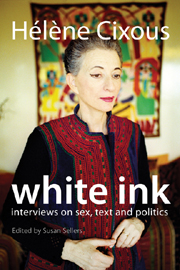Book contents
- Frontmatter
- Contents
- Acknowledgements
- Editor's note
- Preface: On being interviewed
- Part I Writing the enigma
- 1 The play of fiction
- 2 The novel today
- 3 Literature suspends death
- 4 In the beginnings, there were many …
- Part II Writing the feminine
- Part III Writing and politics
- Part IV Writing and theatre
- Part V Writing roots
- Part VI On painting, music and nature
- Part VII Dialogues
- Envoi: But the Earth still turns, and not as badly as all that
- Bibliography of Hélène Cixous's works
- Index
1 - The play of fiction
from Part I - Writing the enigma
- Frontmatter
- Contents
- Acknowledgements
- Editor's note
- Preface: On being interviewed
- Part I Writing the enigma
- 1 The play of fiction
- 2 The novel today
- 3 Literature suspends death
- 4 In the beginnings, there were many …
- Part II Writing the feminine
- Part III Writing and politics
- Part IV Writing and theatre
- Part V Writing roots
- Part VI On painting, music and nature
- Part VII Dialogues
- Envoi: But the Earth still turns, and not as badly as all that
- Bibliography of Hélène Cixous's works
- Index
Summary
This interview might also be translated as “The fiction-writing game” or “The stakes of fiction”. It originally appeared as “Questions à Hélène Cixous” [Questions for Hélène Cixous], in (en)jeux de la communication romanesque, Suzan van Dijk & Christa Stevens (eds), 321–2 (Amsterdam: Rodopi, 1994).
cs Hélène Cixous, you have often described your work as a journey or wandering [cheminement] — a journey that has taken you from “the unconscious stage” — that is, from personal and internal texts — to “the History stage”, or the major plays you wrote for the Théâtre du Soleil. These wanderings take you towards the Other, towards others, be they your historical contemporaries, or, in the exploration of the “I”, those others of the I itself. And within that journey lies another that tells the story of the quest of someone making her way in the dark, with her eyes closed, towards the light, in her joys, her suffering, her contradictions, her crimes too. You take great risks along the way, entering territory where you don't know what you'll find. And yet, how can one communicate what is, by definition, outside the field of vision, of naming, of representation? How can one convey this darkness, transmit the untransmissable, the as-yet unknown, or what is likely to go unseen?
cixous A humble word like “wandering” really is the right way to put it, since humble is what is close to the earth — humus — and bespeaks the humility of writing.
- Type
- Chapter
- Information
- White InkInterviews on Sex, Text and Politics, pp. 3 - 14Publisher: Acumen PublishingPrint publication year: 2008

